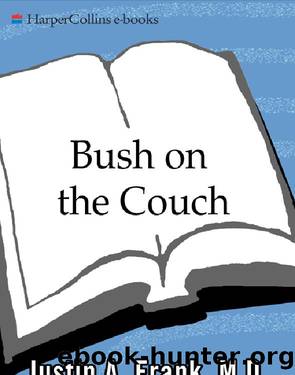Bush on the Couch Revised Edition by Justin A. Frank M.D

Author:Justin A. Frank, M.D. [Justin A. Frank]
Language: eng
Format: epub
ISBN: 9780061739781
Publisher: HarperCollins
Published: 2007-10-15T00:00:00+00:00
Who can argue with that? But how can one defeat a word?
By highlighting Bushâs indifference to meaning and communicationâwhich our bemused disbelief often lulls us into overlookingâMiller and Brooks, among others, are helping draw the nationâs attention to the most disturbing aspect of Bushâs use of language. Like the travesties of misrepresentation he uses to disguise his attitudes toward the skies, the forest, or the children his budget cuts so cruelly leave behind, the patterns Miller and Brooks identify underscore how Bush perverts language not just to evade, but also to control. His tendency to hamper discourse, in other words, it has the effect of steering itâand itâs no coincidence that the result is often to his advantage.
Such attempts to control the dialogue can take many forms. As weâve seen, Bush uses language to attack (âa face for radioâ), dismiss (âI better call my lawyerâ), distract (âKenny who?â), intimidate (âBring âem onâ)âasserting his power and authority along the way. Of course, whenever he is touting his power to others, his message is also directed ultimately toward himself, constantly reassuring himself that heâs in control. This is clearer when he positions himself as having divine authorityâas in March 2004, when he told an audience in Los Angeles, âGod loves you, and I love you. And you can count on both of us as a powerful message that people who wonder about their future can hear,â when he asserts his god-like power by speaking of âmyâ army or âmyâ country, or makes references to God, Jesus, and his divinely ordained mission. The fractured syntax of comfort sends a strong hidden message of power: Donât worry about your future. God and I are taking care of it for you.
It may be hard to imagine a person with the self-confidence to equate himself with God; yet such hands offâIâm handling it messages are generally the product of being frightened. What does George W. Bush fear? He probably couldnât answer, though any analyst could identify a number of possibilities worth investigating, most involving the prospect that his lies, his limitations, or the less healthy aspects of his personality might be exposed.
Ultimately, though, both the process of spreading fear and the effects of the fears themselves may be of more immediate relevance than the fears themselves. His perversion of language reflects his disregard for other peoplesâ wordsâand what are laws, after all, but formations of words? In Bushâs troubled perception, law is as easily perverted as any other language. Furthermore, when he detaches language from meaning, he deprives the electorate of its voiceâof the very words with which the nation can shape and register its dissent. Though the apparent humor of Bushâs verbal blunders may lull us into taking our own words no more seriously than he appears to take his, our complacency distracts us from a legitimate danger. If we adopt a similar attitude to our own language, our words will be as profoundly robbed of their meaning as his have been. The result: Our dissent is quieted, if not entirely silenced, out of fear that it lacks authority or relevance.
Download
This site does not store any files on its server. We only index and link to content provided by other sites. Please contact the content providers to delete copyright contents if any and email us, we'll remove relevant links or contents immediately.
The Secret History by Donna Tartt(19092)
The Social Justice Warrior Handbook by Lisa De Pasquale(12191)
Thirteen Reasons Why by Jay Asher(8912)
This Is How You Lose Her by Junot Diaz(6889)
Weapons of Math Destruction by Cathy O'Neil(6281)
Zero to One by Peter Thiel(5802)
Beartown by Fredrik Backman(5756)
The Myth of the Strong Leader by Archie Brown(5509)
The Fire Next Time by James Baldwin(5448)
How Democracies Die by Steven Levitsky & Daniel Ziblatt(5219)
Promise Me, Dad by Joe Biden(5154)
Stone's Rules by Roger Stone(5088)
A Higher Loyalty: Truth, Lies, and Leadership by James Comey(4964)
100 Deadly Skills by Clint Emerson(4927)
Rise and Kill First by Ronen Bergman(4790)
Secrecy World by Jake Bernstein(4753)
The David Icke Guide to the Global Conspiracy (and how to end it) by David Icke(4720)
The Farm by Tom Rob Smith(4514)
The Doomsday Machine by Daniel Ellsberg(4490)
